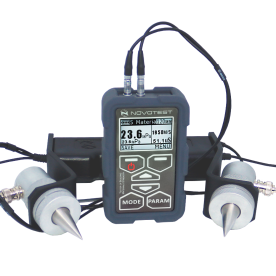- Home
- About Us
- Products
- Rohmann Eddy Current
- Secu-Chek UV-LED Lamps
- Sonatest
- MR Chemie
- NOVO DR
- Hoffmann Tam Panels
- Desoutter Industrial Tools
- Novotest
- Integrated Design Tools (IDT Vision)
- Dakota NDT
- DeFelsko Corporation
- AVIONICS
- Sonotec Ultrasonic Solutions
- Sonotec Ultrasonic Hand-Tools
- G.A.L. Gage Company
- Western Instruments Inc.
- Esders Gas Technology
- Yoancomposite
- Hinode Electric
- Services
- News
- Contact Us
 (65) 6878 0608  (65) 6878 0609 |

STRENGTH METER NOVOTEST IPSM
Strength Meter NOVOTEST IPSM is an Ultrasonic Pulse Velocity (UPV) tester for finding defects in concrete products, bricks and other solid materials based on the analysis of the propagation of ultrasonic waves in the material. Two transducers are connected to the device (transmitter and receiver), during operation, the device gets the time of propogation ultrasonic waves between the transducers, having a fixed base (distance between the transducers), the device calculates the velocity of ultrasonic waves in the material, based on which it is possible to build a correlation with the testing parameter. The method allows users to evaluate such parameters as strength, density, elastic modulus, sound index and other parameters that have a correlation with the velocity of propagation of ultrasound in the material. The device meets the ASTM C597-16 (Standard Test Method for Pulse Velocity Through Concrete).
The main advantages and tasks the Strength Meter NOVOTEST IPSM can solve:
STRENGTH MEASUREMENT
Strength measurement of solid building and composite materials is the primary purpose of the Strength Meter NOVOTEST IPSM. The device has presets for determining the strength of several of the most common materials, such as heavy and lightweight concrete, and several types of bricks. However, for the most accurate strength assessment, individual calibration for a specific material is recommended.
DENSITY MEASUREMENT
Also a parameter that can be measured by an indirect method (through ultrasound). In the presence of samples of known density, it is possible to calibrate the device for the available material, and then quickly evaluate the density without destroying, weighing, or other manipulations with the tested object.
SEARCH FOR SPACES AND CRACKS
The device allows user to assess the bearing capacity of reinforced concrete structures, porosity and the presence of cracks that occurred during the manufacture and operation, texture of composite materials and the degree of anisotropy. Using a surface sounding probe, it is possible to measure the depth of surface cracks.
MEASURING OTHER PARAMETERS
The presence of an A-scan signal display function in the device allows the user to configure the device on almost any sample. Strength Meter NOVOTEST IPSM allows to test any parameters of solids that correlate with thevelocity of ultrasonic waves in the material, for example:
– assessment of the degree of maturity of concrete in the process of monolithic concreting;
– the elastic modulus of fiberglass and carbon graphite;
– determination of the sound index of building ceramics and abrasives, etc.
DESIGN
The use of the latest developments in circuitry and modern electronic components made it possible to realize a high-quality acoustic track, a powerful ultrasonic pulse generator and a low-noise receiver in a compact body – all this makes it possible to significantly increase the testing range, as well as increase the sensitivity of the device when defects are detected. The Strength Meter NOVOTEST IPSM is designed for operation in temperature range from -20 to +40 C °. Thanks to the protective silicone case, the device case becomes shockproof.
MEMORY AND SOFTWARE
The device has the function of saving the measurement results to the archive, that can be transferred to the PC using special software, for subsequent data processing.
Advantages:
- Measurement of the strength and density of concrete, bricks and silicate stones, other solid building and composite materials.
- Assessment of the bearing capacity of reinforced concrete structures, porosity and the presence of rock cracks, texture of composite materials and the degree of anisotropy.
- Assessment of the degree of maturity of concrete in the process of monolithic concreting.
- Seraching for spaces, cracks and other internal defects arising during the manufacturing and operation.
- Testing of material uniformity.
- Measurement depth of surface cracks.
- Determination of the sound index of ceramics and abrasives.
- Determination of the density and elastic modulus of fiberglass and carbon graphites.
| specifications | |
| The range of measurements of the propagation of ultrasonic vibrations, µs | 10 … 9999 |
| The measurement resolution of the propagation time of ultrasonic vibration, µs | 0.1 |
| The operating frequency of the ultrasonic oscillations, kHz | 50-100 |
| The base surface sounding measurements in mm | 120 |
| The output voltage, V | up to 600 |
| Storage of measurement results | 128 (1000 cells) |
| Overall dimensions of el. unit, mm | 122x65x23 |
| Operating temperature, ° C | -20…+40 C° |
| Power | 2 pcs AA batteries |
| Time of continuous operation, h, not less | 10 |
| Standard | ASTM C597-16 |



